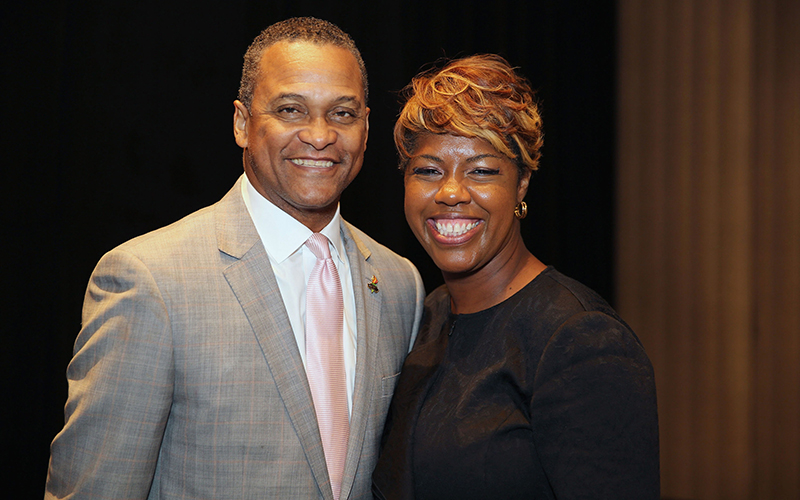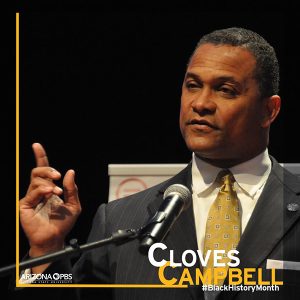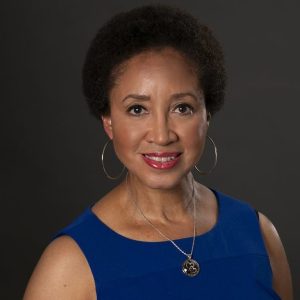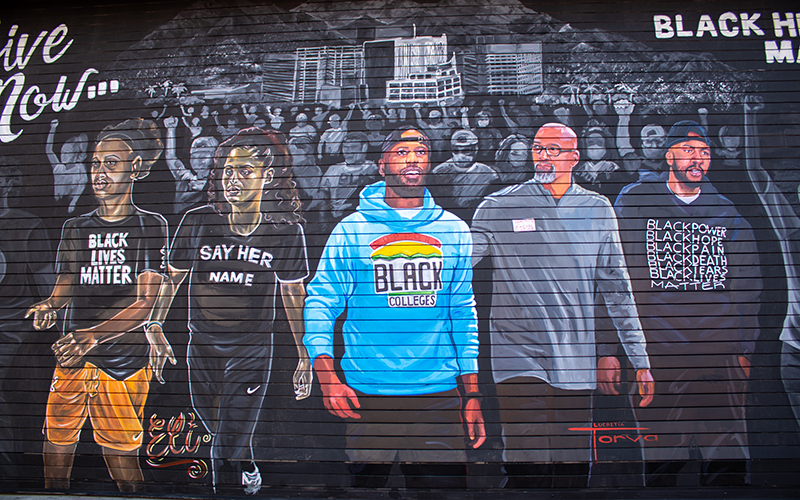
Cloves C. Campbell Jr., in this 2015 file photo with Jocelyn Allen in Detroit, is publisher of the Arizona Informant, whose motto is “We record Black history every week.” (Photo by Monica Morgan/Getty Images)
February is Black History Month, and Arizona PBS is honoring the contributions and achievements of Black Americans. Meet three influential leaders who have made an impact on our state.
Meet Cloves C. Campbell Jr., publisher of the Arizona Informant
Cloves C. Campbell Jr. has dedicated his life to positively representing the Black community in print media. His father, Cloves C. Campbell Sr., was the first African American elected to the Arizona Senate and, in 1969, he created the state’s oldest and largest Black weekly newspaper, the Arizona Informant. The younger Campbell has since taken over as publisher, sharing informational and uplifting stories about the Black community.
“We try to highlight some of the positive things that happen in our community,” he said. “It’s easy to write about negative stuff all the time.”
Arizona PBS: As owner and publisher of the Informant, what are you doing to ensure that Black history is kept alive in our community?
Campbell: Our motto has always been that “We record Black history every week.” Ninety-eight percent of the news you read in our publication you probably won’t read anywhere else. Our goal is to highlight the achievements and accomplishments of the African American community and make sure we can find those stories — find those individuals — that are doing positive things.
Arizona PBS: Thinking about the Black Lives Matter movement and the national political climate, do you believe that the Black community is marginalized?

Campbell: Well, absolutely. In 1966, when my dad was first elected to the Senate, he was the only African American senator there out of 30 individuals. Fast forward to today, and we have no African American senators. I think there’s really a big void in representation for African Americans as a whole.
Arizona PBS: Why is representation in the news media important?
Campbell: Without the Black press, there’s really no real major media outlets out there covering the African American community and highlighting some of the things that we’re doing. Young people have never really seen themselves in print, and when they do, they get really excited. We want to keep them excited and put them on the front pages of our publication.
Arizona PBS: For years, you have dedicated your life to activism and social justice in the office and out – how do you keep the fight going?
Campbell: One, these three little grandkids running around my house. But really, it’s every time I wake up, it’s an opportunity to help somebody. If I can do something to help a kid get a scholarship, help somebody get a job, or anyway we can highlight an opportunity to get somebody and put them in a better situation, that’s the reason I wake up every day.
Arizona PBS: How are you and the Arizona Informant celebrating Black History Month?
Campbell: Black History Month is just one month, and at our newspaper, at our business, we celebrate Black history every day.
Arizona PBS: What are you most proud of?
Campbell: I’ve been able to lead delegations in Africa, to China, in Germany, to talk about the Black press, and to create greater opportunities for Black persons in those different countries. I spent a lot of time while I was in the Legislature and in leadership with the Black president, the White House when President Obama was in office. That opportunity alone, to be with the history makers, is probably one of my biggest accomplishments.
Arizona PBS: Is there more that needs to be done?
Campbell: There’s a whole lot of work to be done. Our goal is to continue to increase the awareness of African American issues in our city and in our state.
Find out more about the Arizona Informant here and discover more passionate local Black leaders in our community here.
Meet Janelle Wood, founder of Black Mothers Forum in Phoenix
Injustices in the criminal justice system disproportionately impact Black people — especially Black men — and Janelle Wood, a Phoenix minister, said her calling is to prompt real change in her community.
Wood, who founded Black Mothers Forum in fall 2016, said her group strives to dismantle systemic racism and ultimately create a safer, more inclusive environment for children and families. Candidly discussing race, social inequalities Black history and more, Wood talked with Arizona PBS about what it means to be a Black American today and how her nonprofit is working toward eradicating racism.

Janelle Wood, founder of Black Mothers Forum in Phoenix, says her calling is to prompt real change in her community. (Photo courtesy of Arizona PBS)
Arizona PBS: What inspired you to start the Black Mothers Forum?
Wood: I believe I was led to this work, especially as I looked around and watched our Black sons being killed by the police; especially those unarmed. I am a mother of a Black son and I know that he may be large in size, but he’s not a threat. I was led to call Black mothers together to bring unity, to bring us together as one voice to speak on the issues that concern our children.
Arizona PBS: What’s your group’s overall mission?
Wood: Our overall mission right now is to dismantle the school-to-prison pipeline. At an early age, we have found that our young people have been targeted, bullied, harassed and intimidated — starting in preschool — by their teachers and administrators. What happens is the child starts to gravitate towards somebody who they feel will protect them, who might not be good for them and get them in trouble. Now you’re labeled as a “bad kid,” you have a discipline record — but what’s that going to do? Push you out of school and push you towards the pipeline headed to prison.
Arizona PBS: In what ways does your group give back to the community?
Wood: We’ve worked with mothers who have lost their children to police brutality. We’ve been there to support them and to help them find resources. We have access to attorneys who will help these families, pretty much pro bono, because we’ve developed relationships with them. The other thing that we’ve been doing is dealing with parents whose children have been taken away from them by the system. Us showing up in court, just our presence, shifts the atmosphere because the judge is like, “Who are all of these women sitting here?”
Arizona PBS: The past few years have highlighted that police brutality is real and requires a public push to combat it. What does your group do in the community to raise awareness about this issue and prompt change?
Wood: I’ve talked to Gov. Ducey on a few occasions where he has orchestrated meetings between me and the various police chiefs to talk about their policies and practices that have an adverse impact on our children. We have those community conversations with our youth to hear their experience with police and then have conversations with the police to hear their fear of our children. We say, “OK, now that we know why you all fear one another, let’s figure out what we need to do differently.”
Arizona PBS: What does Black History Month mean to you?
Wood: I am Black history. Being a Black mama is Black history. Every day that we push against the systemic barriers that are placed in front of us and we continue to live and be resourceful is a historical day. Every time that we breathe is a historical moment because there’s so much against us.
Arizona PBS: Do you have any resource recommendations on how people can stay educated about the problems people of color face, particularly people whose eyes have been recently opened to injustices and want to be better allies for change?
Wood: Three books: “The Color of Law,” “How to Be an Anti-Racist” and “The New Jim Crow.”
Learn more about the goals of the Black Mothers Forum and sign a pledge to end racism here.
Meet Jimmy Scroggins of the 4Life Foundation
When you ask a child who their role models are, they’re likely to name a celebrity, athlete or maybe even a first responder. But what about the everyday person; someone they can relate to? Jimmy Scroggins of Phoenix said his goal is to encourage youth across Arizona to keep pushing and find their passion. To some, he’s already doing a hero’s work.
Scroggins founded the 4Life Foundation in 2019 but has been actively engaged in the Black community for six years. As a kid, he didn’t feel anyone, or any organization, was focused on empowering and motivating young people. This inspired him as an adult to use his platform to help guide future community leaders and make a positive difference.

Jimmy Scroggins, who founded the 4Life Foundation in 2019, says his goal is to encourage youth across Arizona to keep pushing to find their passion. (Photo courtesy of Arizona PBS)
Arizona PBS: What inspired you to start the 4Life Foundation?
Scroggins: I didn’t see a lot of positive organizations that were 100% committed to just helping young people. I wanted to create something that could provide magical experiences, and the fact that it has evolved into that is just absolutely emotional and unreal.
Arizona PBS: What’s the overall goal for your foundation?
Scroggins: I want to reach as many people as I possibly can and just ultimately help younger people understand that they, too, are capable of going out and serving their community in ways that they see fit — it doesn’t always have to be some movie star or NBA player. We have the ability to go back into our own communities and make the appropriate changes or experiences that we feel lacked when we were that young kid.
Arizona PBS: What are some of the fundraising events you sponsor for the community?
Scroggins: Lets go to 2020, the whole world is going crazy, right? Everyone is like, “Is Christmas canceled?” This event (the foundation’s Christmas drive) has grown massively every single year, and I knew there was a need to go out into the community and be a pillar that promotes positivity. We were able to service 3,000 to 4,000 kids. To show up to a parking lot and to see vehicles backed up about 5 to 6 miles was absolutely unreal. Then to watch all of those vehicles navigate their way through this parking lot filled with toys, candy and love … it was very magical.
Arizona PBS: What does Black History Month mean for you, your community and your foundation?
Scroggins: With me being African American, it means a lot to me to be able to have a moment in time where the world kind of just stops for a second and highlights the many things that Black individuals have been able to do and put their stamp on. I think I speak for myself and the community when I say it means a lot to younger Black kids because they’re able to stop and say, “A Black person did this?” So, it’s not so far-fetched for me to hope and dream, right?
Arizona PBS: What are some of the changes you have noticed in the kids you work with from the start of your journey to where the foundation is now?
Scroggins: Just the overall positivity. These kids are reaching out to me and they are just so excited about waking up. Maybe they were having issues with a parent and all of a sudden they’re waking up and they’re just able to say, “Hi Mom, I love you.” They’re able to study more and be more focused and determined. I’ve been able to impact so many young people on so many different levels; just seeing how much those young people are impacting their families and seeing their visions for their own success is insane.
Arizona PBS: What advice would you give to kids who might feel as if they don’t have purpose or hope?
Scroggins: Find something that you are extremely passionate about — something you love — and just go from there. When you find that passion, write it down and believe in it. Just keep pushing through whatever obstacles come your way. And again, just continuously find a way to think positive.
Find out more about the 4Life Foundation and how you can volunteer here.
EDITOR’S NOTE: These interviews have been edited and condensed.
Preview the programs Arizona PBS is running in February in celebration of Black History Month. In the coming weeks, we will air historical documentaries, award presentations, in-depth interviews and more. Find more information at Arizona PBS. Hear more from local Black leaders in our Our Voices series.
